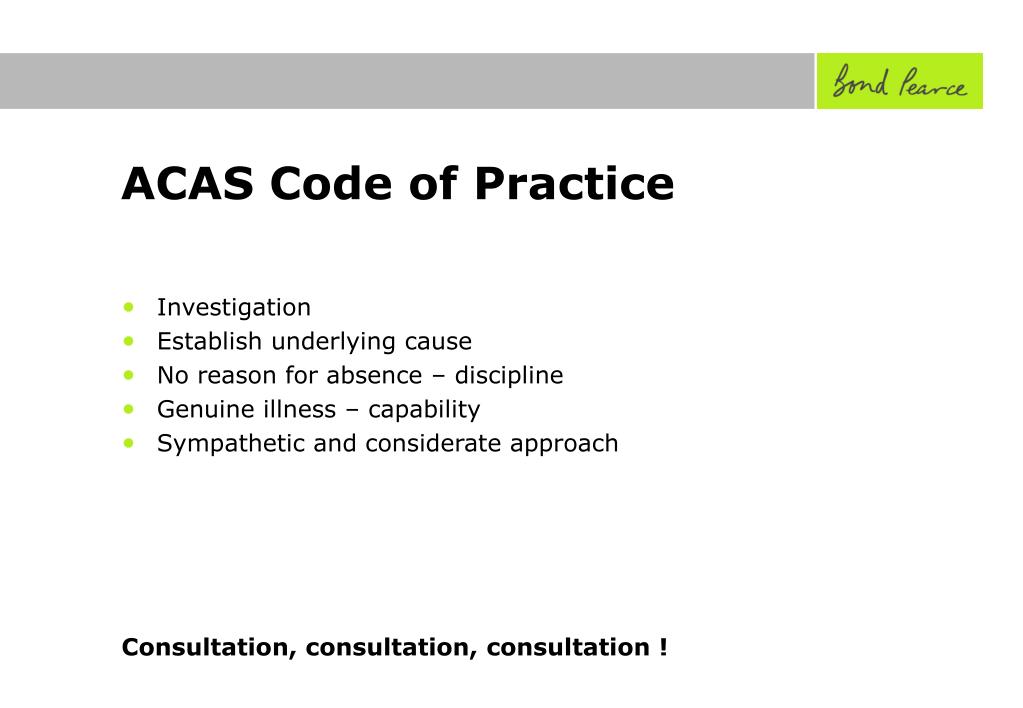Acas Capability Dismissal
For example, if the employee was dismissed for misconduct or lack of capability, it is necessary to consider whether he was warned and given a chance to improve or, if redundancy was the reason for dismissal, whether the employee was considered for alternative work within the same organisation. EMPLOYMENT LAW TOPIC: DISMISSALS LECTURE 4 UNFAIR DISMISSAL Key topics. Rules for Conduct dismissals & ACAS Code of Practice. Basic award – Week’s pay. Maximum amounts – week’s pay & compensatory award. Compensatory award – heads of loss, including loss of statutory rights. Overlapping remedies. Application of topics from lecture 3. Critical discussion of need to.
As a matter of best practice, in cases of conduct or capability matters, you should always refer to the guidance set out under the ACAS Code of Practice on Disciplinary and Grievance Procedures. This involves a variety of steps that must be taken before making any decision to dismiss, including written warnings and suitable training, where. A model fair procedure is defined in the ACAS Code of Practice on Disciplinary and Grievance Procedures which of itself is not statute but if you break the Codes minimum standards it will be enormously difficult to convince a Tribunal that what you did was fair. Tribunals are bound to take into account the size and administrative resources of.
Dismissing someone fairly
Before you dismiss an employee, you should:
- believe you have a valid reason for dismissing them
- follow a full and fair procedure in line with the Acas Code of Practice on disciplinary and grievance procedures
- make a decision that's balanced, consistent and as fair as possible
If you do not, the employee could make a claim for unfair dismissal, even if the reason you dismissed them was valid.
The procedure you follow will be taken into account if a case reaches an employment tribunal.
Dismissal for conduct or capability reasons
You should handle issues of unacceptable or inappropriate behaviour ('misconduct') or performance ('capability') in line with the Acas Code of Practice on disciplinary and grievance procedures.
You can use the disciplinary procedure step by step guide to help you through the process.
If the employee cannot do their job or is performing badly for a reason that's not their fault, you should still handle the issue in line with the Acas Code of Practice.
Gross misconduct
Gross misconduct is when an employee has done something that's very serious or has very serious effects.
Examples could include:
- fraud
- physical violence
- serious lack of care to their duties or other people ('gross negligence')
- serious insubordination, for example refusing to take lawful and reasonable orders from a supervisor
Your workplace might have its own policy or rules with other examples of gross misconduct.
Dismissal because of long-term illness
Dismissal should be a last resort after you've tried other ways to support the employee and help them get back to work. This could include making any reasonable adjustments if they have a disability (this includes some long-term health conditions).
It may be fair for you to dismiss someone on long-term sick leave, depending on the circumstances.
For example, you may be able to dismiss someone fairly if:
- you've considered all other options
- it's not possible for the employee to do their job
- the person not being able to work has a significant impact on your business
You must investigate fully and have a valid reason for dismissal. The employee could make a claim to an employment tribunal if they think they've been unfairly dismissed.
Dismissing someone because they're disabled (this includes some long-term health conditions) is unlawful discrimination.
Giving the reasons for dismissal
If you dismiss an employee, you must tell them:
- why they've been dismissed
- when their employment contract will end
- their notice period, if there is one
- their right to appeal the decision
It's a good idea to put it in writing.

When you must put the reasons in writing
You must put the reasons in writing for an employee who's pregnant or on maternity leave, regardless of how long you've employed them.
Other employees have the right to ask you for a written statement giving the reasons for their dismissal if they have:
- 'employee' employment status
- been employed by you for 2 years
If they ask, you must give them the reasons in writing within 14 days.
Telling other people at work
You should respect the confidentiality of the person who's been dismissed when you tell colleagues and clients that they've left. For example, any outcome of a disciplinary procedure must remain confidential.
Find out more about talking to staff after a disciplinary procedure.
Settlement agreements
A settlement agreement is sometimes used when an employer and employee agree to end their employment relationship because they both agree it's no longer working. This can include some dismissal situations.
Acas Capability Dismissal Vs
Find out more about settlement agreements (PDF, 512KB, 66 pages).
Acas Capability Dismissal Rules
If you're thinking about using a settlement agreement, you should get legal advice.